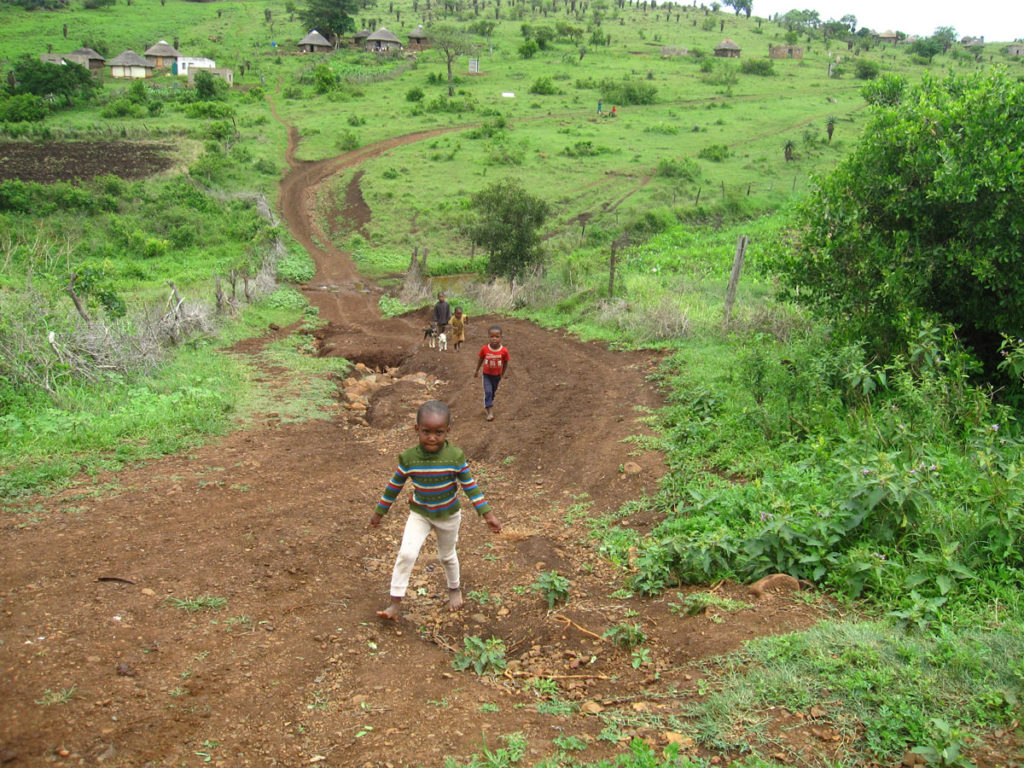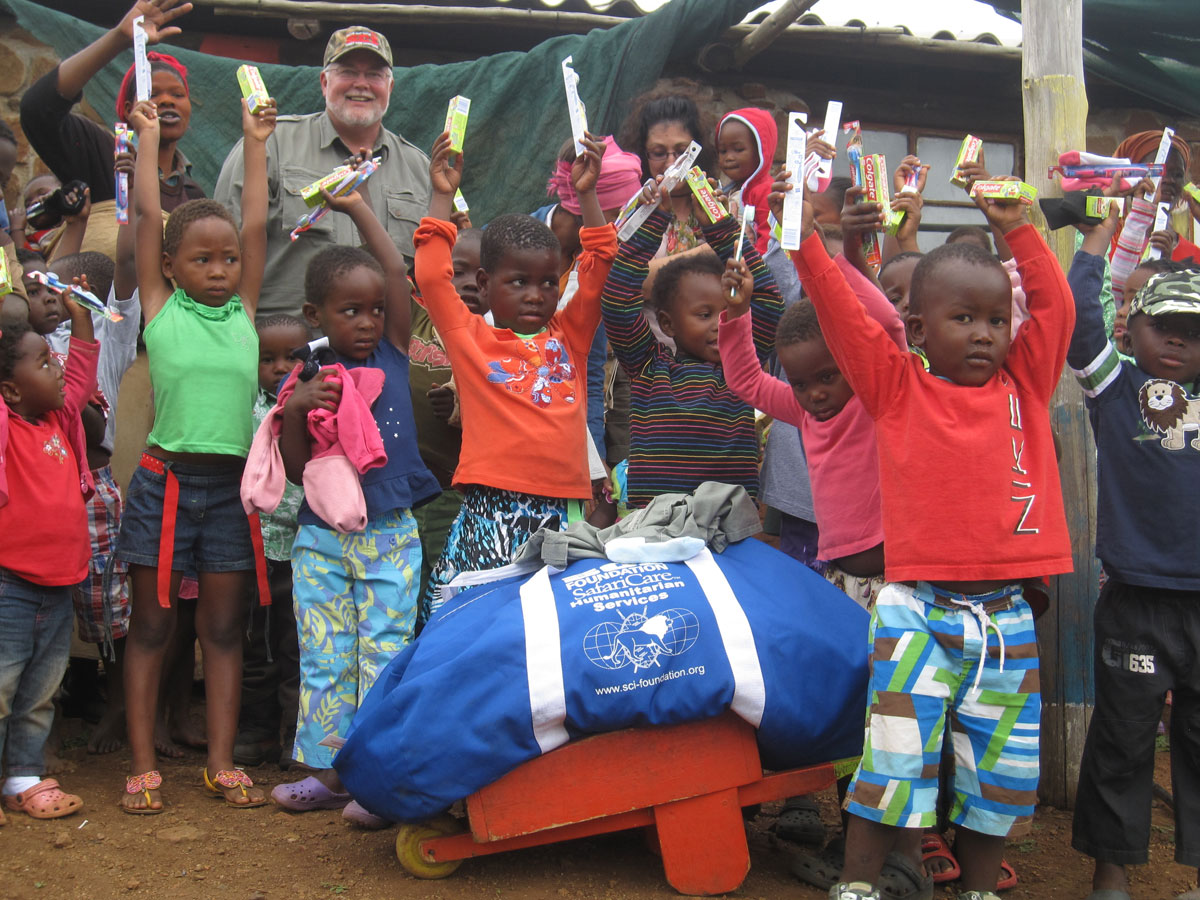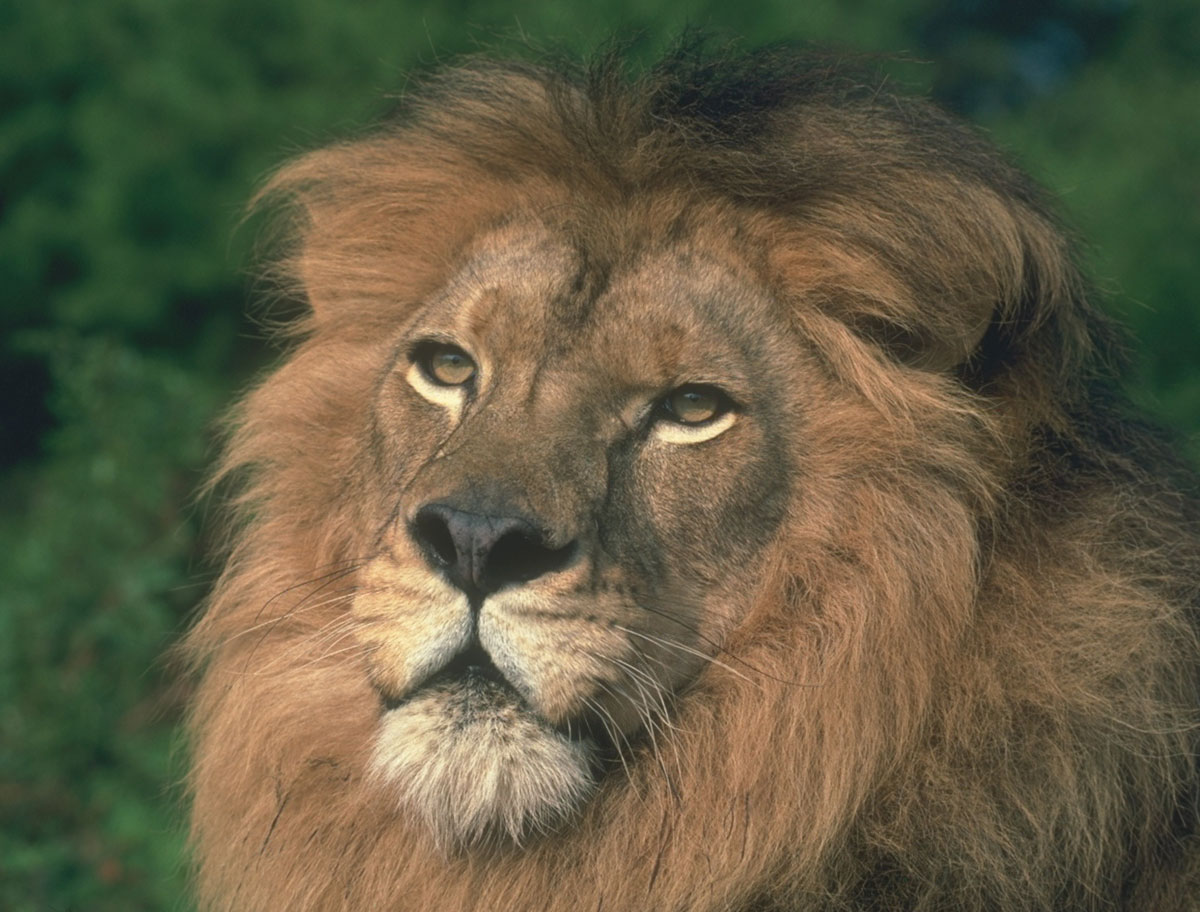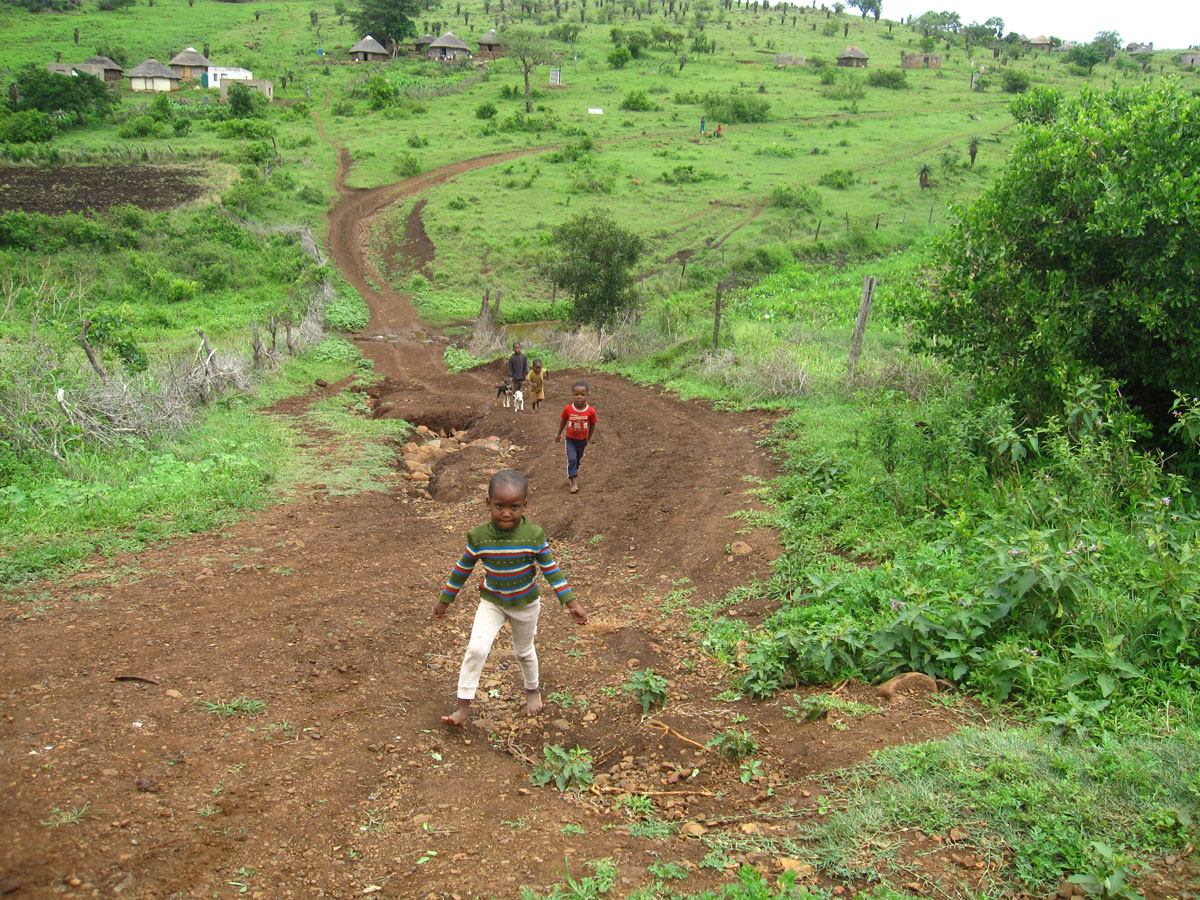 The houses were small, almost invisible in the springtime landscape and it looked like children were popping out of every bush the Land Cruiser passed.  “Sweeties, sweeties,” they yelled, running toward the car.
The houses were small, almost invisible in the springtime landscape and it looked like children were popping out of every bush the Land Cruiser passed.  “Sweeties, sweeties,” they yelled, running toward the car.
The visit to this preschool was probably the most planned part of our photo safari with Kido Safaris, purchased last spring at the annual banquet of Treasure Valley Chapter of Safari Club International. Preparations started six weeks prior to our departure when we contacted Karen Crehan, Program Coordinator for the Education Department of SCI Foundation, and inquired about obtaining a Safari Care bag (Blue Bag) to take with us. A few days later we were scouting about town searching for clothes and other items that two- to six-year-old children would need. Since Richard’s intent was to take 300 suckers for the children, a gift that the doctor in me didn’t like, I decided to ask our dentist for toothpaste and toothbrushes as a countermeasure. Poppleton Family Dentistry generously donated thirty-six tubes of toothpaste and toothbrushes. We also secured shoes, socks, clothing, school and medical supplies. Fortunately, everything fit into the big blue bag and made its long journey unscathed from Twin Falls, Idaho, to Zululand Rhino Reserve in KwaZulu-Natal Province of South Africa.
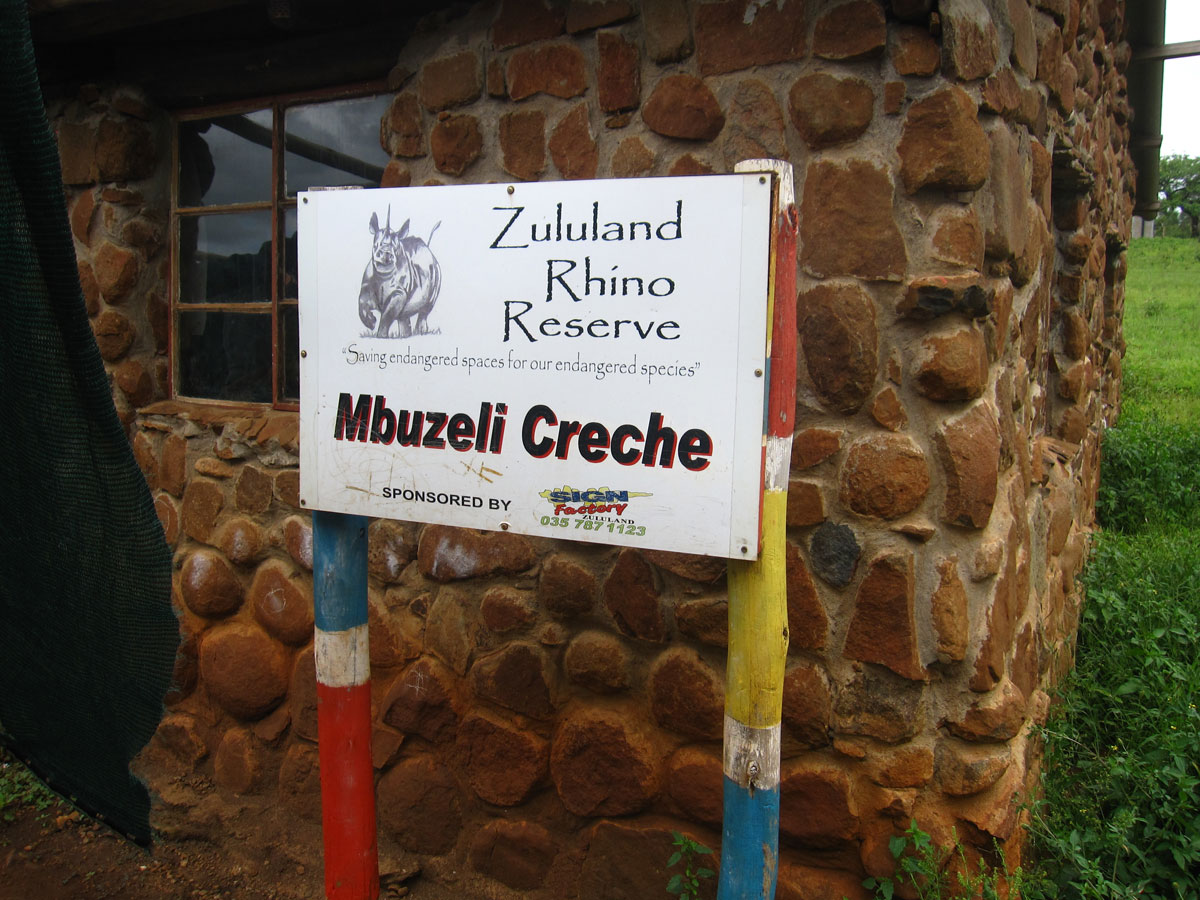 The evening before we were to visit the creche, our 24/7 Kido Safaris guides, Michael Loetter and Jesse Owen, discussed and settled the details for our trip. Mike had planned a trip that day to an elephant park with the other guests and it was Richard, Jesse and me who approached the small Zulu community Thursday mid-morning. As usual, Jesse was preparing us for a comprehensive and thoughtful experience with some relevant information. He explained that there are four communities bordering the reserve‚Äôs western boundary–Msunduze, Manyoni, Sekane and Vungame, the one we were about to visit, and they all fall under Mandlakazi Tribal Authority. Later, I learned tribal authorities are a form of localized rural governance with a chief appointed by the president, but ascribed by lineage, who can pass rules regarding issues like wood access and grazing space for livestock, and can settle civil disputes in the area. Some people believe that tribal authorities are a remnant of the apartheid system, nowadays being an obstacle for democratization of rural South Africa. ‚ÄúHe lives someplace else, in the mountains,‚Äù replied Jesse to my question if we were going to meet the tribal leader.
The evening before we were to visit the creche, our 24/7 Kido Safaris guides, Michael Loetter and Jesse Owen, discussed and settled the details for our trip. Mike had planned a trip that day to an elephant park with the other guests and it was Richard, Jesse and me who approached the small Zulu community Thursday mid-morning. As usual, Jesse was preparing us for a comprehensive and thoughtful experience with some relevant information. He explained that there are four communities bordering the reserve‚Äôs western boundary–Msunduze, Manyoni, Sekane and Vungame, the one we were about to visit, and they all fall under Mandlakazi Tribal Authority. Later, I learned tribal authorities are a form of localized rural governance with a chief appointed by the president, but ascribed by lineage, who can pass rules regarding issues like wood access and grazing space for livestock, and can settle civil disputes in the area. Some people believe that tribal authorities are a remnant of the apartheid system, nowadays being an obstacle for democratization of rural South Africa. ‚ÄúHe lives someplace else, in the mountains,‚Äù replied Jesse to my question if we were going to meet the tribal leader.
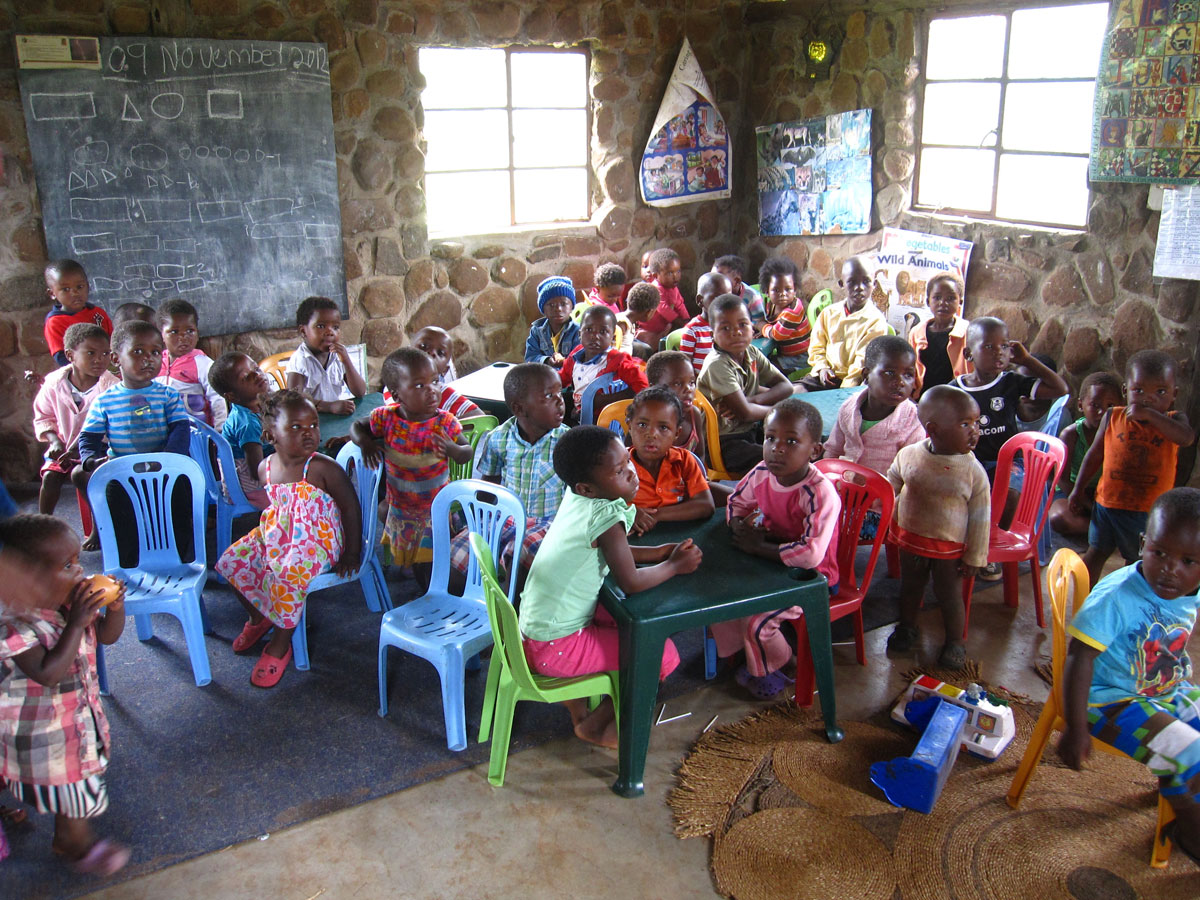 In fact, I should have said that the village approached us first, because of those exuberant bare-foot children who ran to meet us and get a sucker.  Soon I felt embarrassed with my unwary concerns, wiped out by Jesse’s remark that for these children having a sucker is not an unhealthy habit, but something rather exceptional, that they probably get once or twice a month. I noticed the bundles of wood and huge water jugs carried by women on their backs or heads, the small huts with little gardens scattered on the hillsides and lack of roads between them. Several women had covered their faces with some kind of clay, sort of traditional Zulu sunscreen, as Jesse noted. Evidence of the hard life these people live was everywhere.
In fact, I should have said that the village approached us first, because of those exuberant bare-foot children who ran to meet us and get a sucker.  Soon I felt embarrassed with my unwary concerns, wiped out by Jesse’s remark that for these children having a sucker is not an unhealthy habit, but something rather exceptional, that they probably get once or twice a month. I noticed the bundles of wood and huge water jugs carried by women on their backs or heads, the small huts with little gardens scattered on the hillsides and lack of roads between them. Several women had covered their faces with some kind of clay, sort of traditional Zulu sunscreen, as Jesse noted. Evidence of the hard life these people live was everywhere.
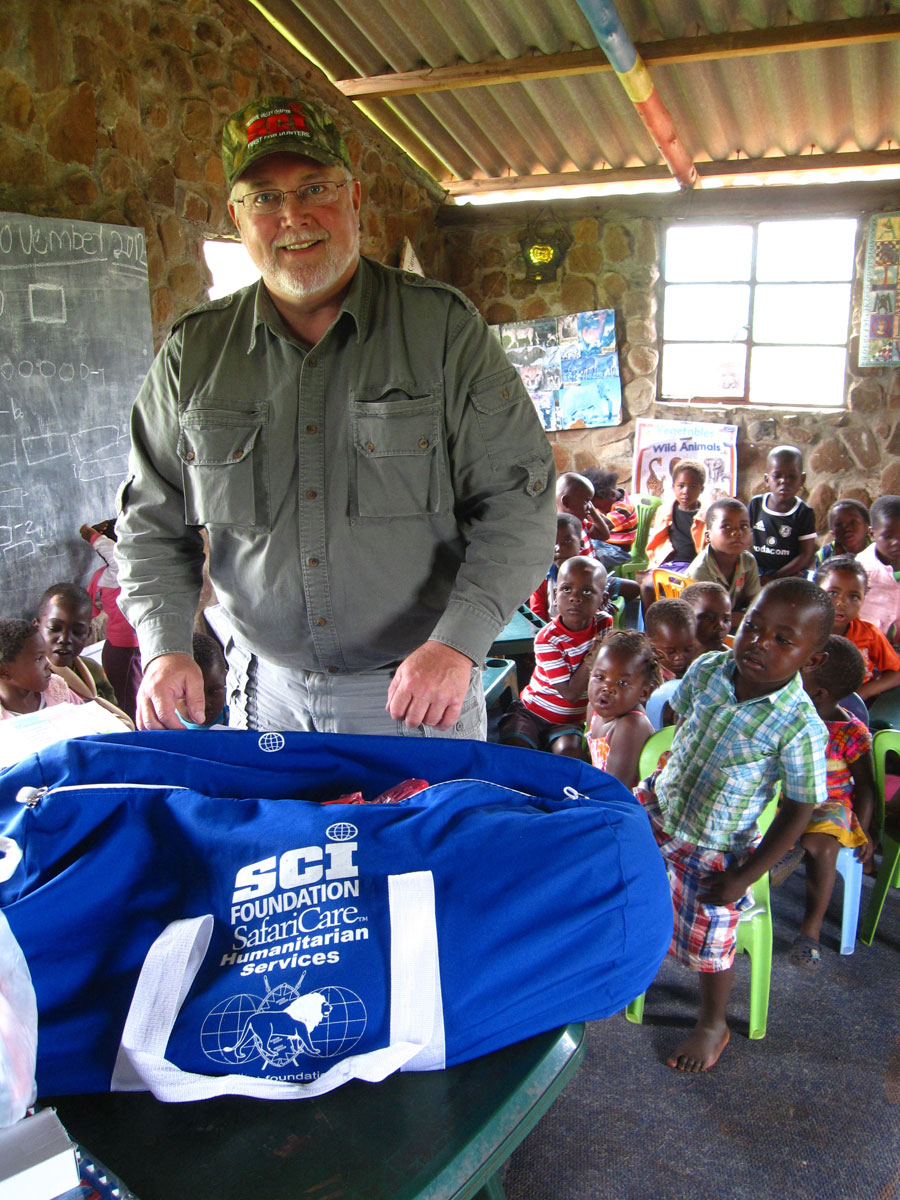 A big sign announced that we had arrived at the preschool, commonly known as crèches. Mbuzeli Crèche is named after the local Zulu leader Mbuzeli Mabuyakhulu. The building, constructed of native stone with a corrugated tin roof, looked big and solid compared to the huts we just drove by. It was built in 2007, when Zululand Rhino Reserve responded to a request from the pre-school committee and gathered the funds and labor for the project. As Jesse explained, this is just one of many community projects conducted by Kido Safaris together with Zululand Rhino Reserve. Henk and Liezle Brink, the young owners of Kido Safaris, want to establish and maintain good relations with the local people, assist them with their needs, help them understand the significance of tourism and why the conservation of all flora and fauna has practical implications for everyone in the area. Considering the magnitude of rhino poaching in the country with nearly 600 animals killed just in 2012, I believe that Zululand Rhino Reserve needs the full support and understanding of the local people.
A big sign announced that we had arrived at the preschool, commonly known as crèches. Mbuzeli Crèche is named after the local Zulu leader Mbuzeli Mabuyakhulu. The building, constructed of native stone with a corrugated tin roof, looked big and solid compared to the huts we just drove by. It was built in 2007, when Zululand Rhino Reserve responded to a request from the pre-school committee and gathered the funds and labor for the project. As Jesse explained, this is just one of many community projects conducted by Kido Safaris together with Zululand Rhino Reserve. Henk and Liezle Brink, the young owners of Kido Safaris, want to establish and maintain good relations with the local people, assist them with their needs, help them understand the significance of tourism and why the conservation of all flora and fauna has practical implications for everyone in the area. Considering the magnitude of rhino poaching in the country with nearly 600 animals killed just in 2012, I believe that Zululand Rhino Reserve needs the full support and understanding of the local people.
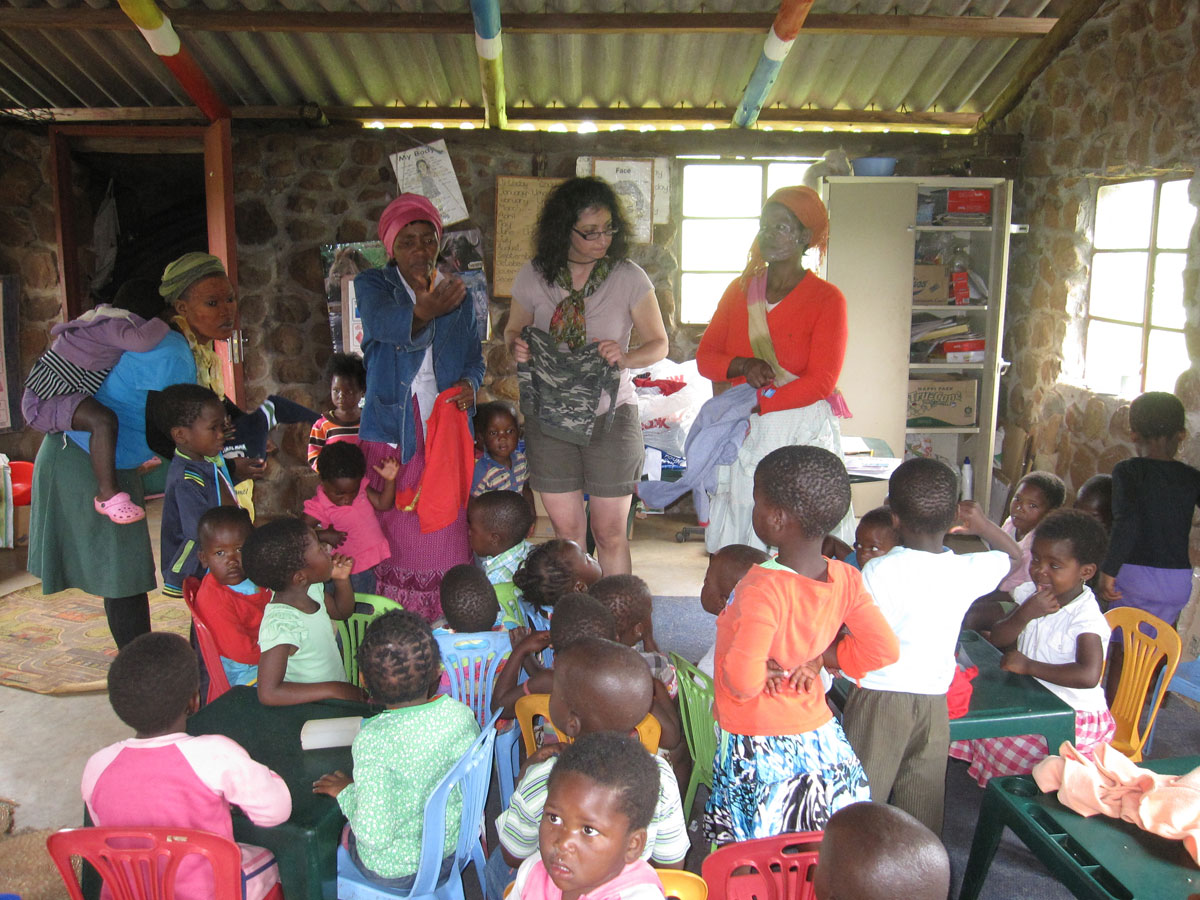 At the entrance of the cr√®che we were met by an attractive lady in a pink dress and matching headscarf. Mrs. Ivy Fakude is the teacher who spends every morning with this young, colorful and always buzzing group. The pre-school is attended by 35 children two to six years old. Ivy greeted us in very good English, something she teaches her students as well. Of course, they communicate mainly in their native language, Zulu. For centuries the region of KwaZulu-Natal has been a melting pot for different cultures. Like our guides, many people there speak English, Afrikaans and Zulu. Ivy welcomed us into the one room pre-school, where the children sat around several small tables, waiting to greet us. A black board on the wall showed the day‚Äôs date, a few geometric figures were drawn on the board–the last lesson must have been simple geometry. There were also posters on the walls showing the parts of the human face and body, the months of the year and the numbers. One poster had English words and their meaning in Zulu. In addition to the small tables, the furnishings included a teacher‚Äôs table and a cupboard where Ivy kept toys, books and other educational materials. We were told that Zululand Rhino Reserve plans to build a child safe outdoor toilet and a shaded play area.
At the entrance of the cr√®che we were met by an attractive lady in a pink dress and matching headscarf. Mrs. Ivy Fakude is the teacher who spends every morning with this young, colorful and always buzzing group. The pre-school is attended by 35 children two to six years old. Ivy greeted us in very good English, something she teaches her students as well. Of course, they communicate mainly in their native language, Zulu. For centuries the region of KwaZulu-Natal has been a melting pot for different cultures. Like our guides, many people there speak English, Afrikaans and Zulu. Ivy welcomed us into the one room pre-school, where the children sat around several small tables, waiting to greet us. A black board on the wall showed the day‚Äôs date, a few geometric figures were drawn on the board–the last lesson must have been simple geometry. There were also posters on the walls showing the parts of the human face and body, the months of the year and the numbers. One poster had English words and their meaning in Zulu. In addition to the small tables, the furnishings included a teacher‚Äôs table and a cupboard where Ivy kept toys, books and other educational materials. We were told that Zululand Rhino Reserve plans to build a child safe outdoor toilet and a shaded play area.
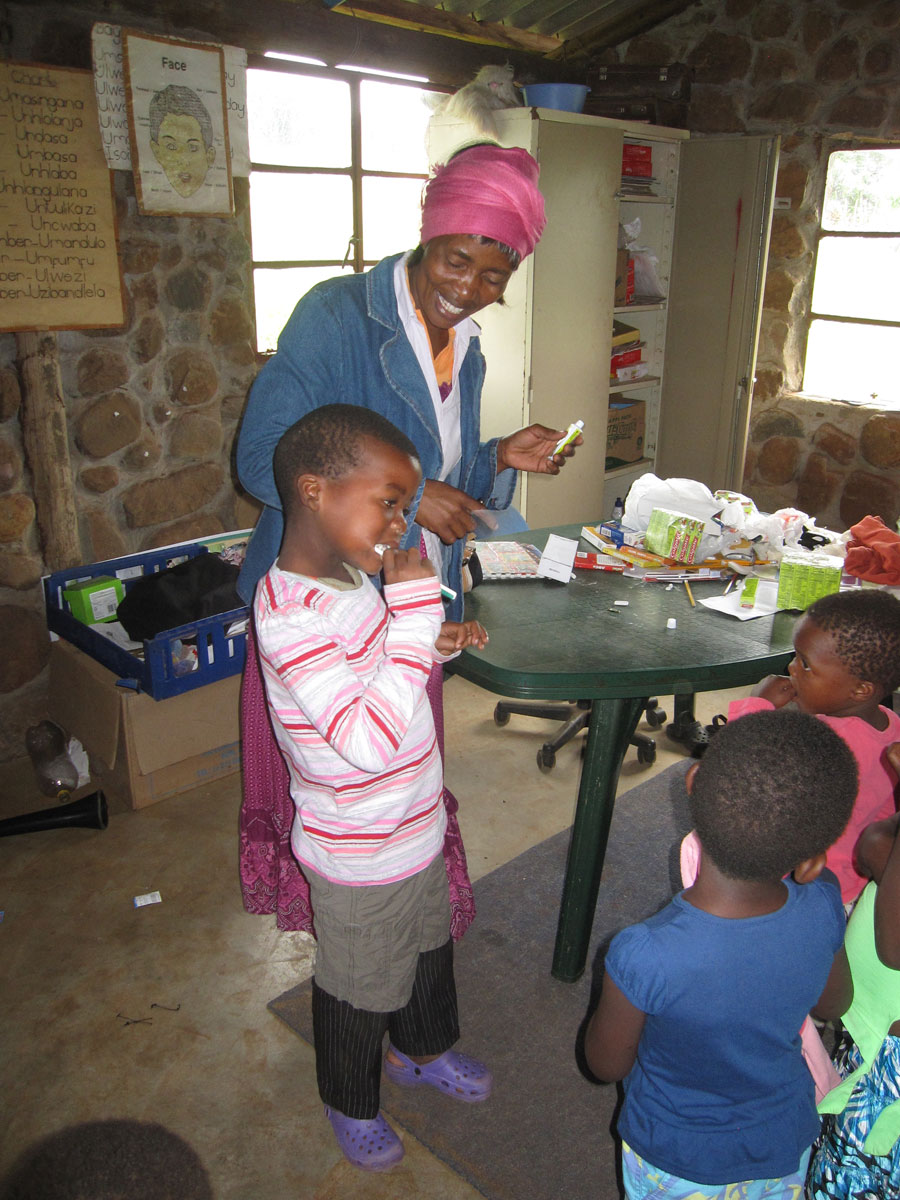 One or two of Ivy’s youngest pupils observed us with caution. Jesse warned us that they associate white people with needles, vaccinations and pain. Careful not to scare them additionally, we left the blue bag on the teacher’s table and listened to the song the older children sang. At the end, we gave them well-deserved applause. Then I started distributing the clothing with the help of Ivy and a few of the mothers who had followed us to the pre-school. Since we had to make sure that everything fit, the task took about an hour and proved the children’s patience and good manners. Then it was time to hand out the shoes. Soon the youngest members of Vungame community were walking around in their new sandals. A short lesson in dental hygiene followed. Since most of the kids had not had toothbrushes, one of the oldest pupils demonstrated their proper use under Ivy’s guidance. Every child would go home that day with his or her first toothbrush and tube of toothpaste.
One or two of Ivy’s youngest pupils observed us with caution. Jesse warned us that they associate white people with needles, vaccinations and pain. Careful not to scare them additionally, we left the blue bag on the teacher’s table and listened to the song the older children sang. At the end, we gave them well-deserved applause. Then I started distributing the clothing with the help of Ivy and a few of the mothers who had followed us to the pre-school. Since we had to make sure that everything fit, the task took about an hour and proved the children’s patience and good manners. Then it was time to hand out the shoes. Soon the youngest members of Vungame community were walking around in their new sandals. A short lesson in dental hygiene followed. Since most of the kids had not had toothbrushes, one of the oldest pupils demonstrated their proper use under Ivy’s guidance. Every child would go home that day with his or her first toothbrush and tube of toothpaste.
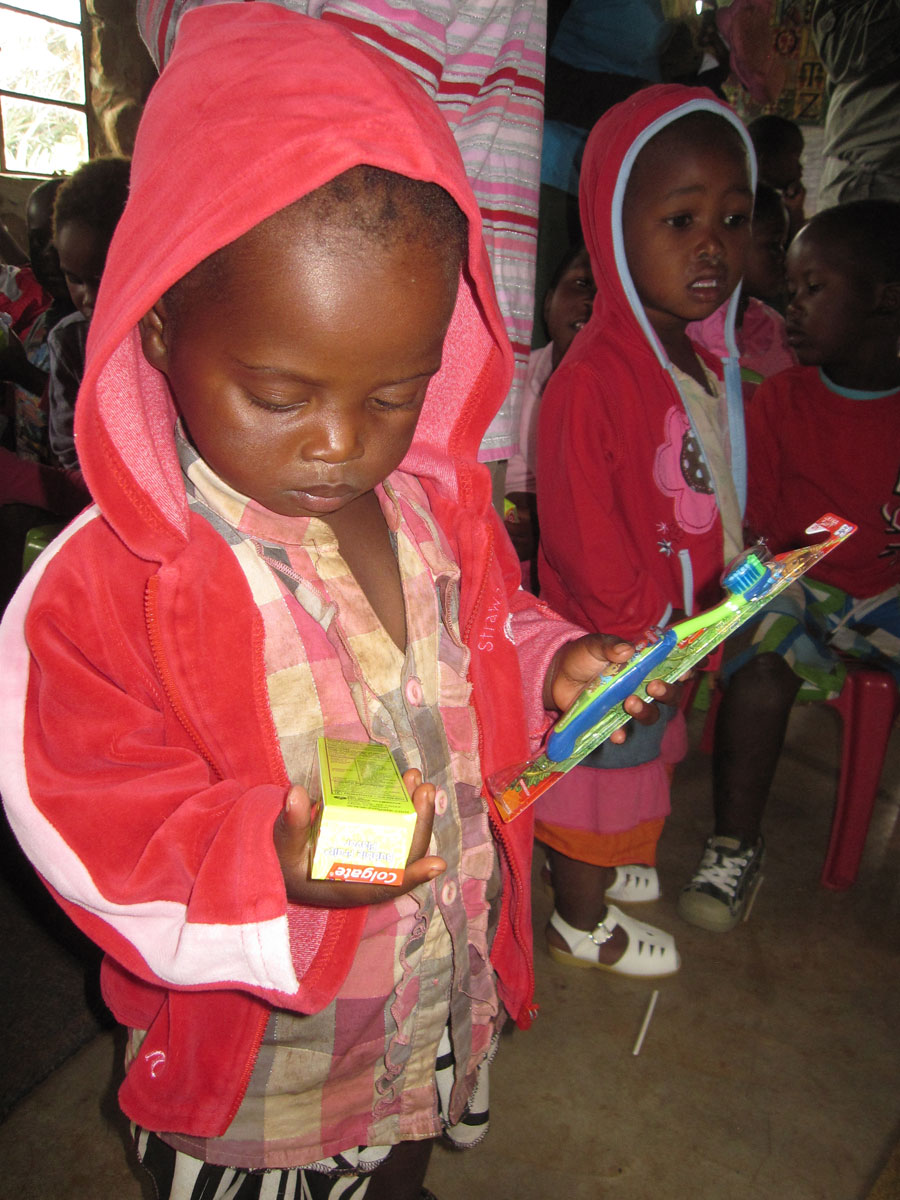 More people kept coming to the pre-school during the time we spent there. When we left the building there was a crowd of women, teenagers and a few elder citizens who had come to greet us. It was evident the community appreciates what Kido Safaris and Zululand Rhino Reserve have done, not only for the young children, but for everyone. There is much good will, understanding, and collaboration and that’s where solving any issue begins. As we got into the Land Cruiser and drove back through the village I was thinking how little we had done, but how grateful the local people were. Was it enough? No, but it is the small steps that lead the path to success and I believe that the people in Vungame and the owners of Zululand Rhino Reserve appreciate any help.
More people kept coming to the pre-school during the time we spent there. When we left the building there was a crowd of women, teenagers and a few elder citizens who had come to greet us. It was evident the community appreciates what Kido Safaris and Zululand Rhino Reserve have done, not only for the young children, but for everyone. There is much good will, understanding, and collaboration and that’s where solving any issue begins. As we got into the Land Cruiser and drove back through the village I was thinking how little we had done, but how grateful the local people were. Was it enough? No, but it is the small steps that lead the path to success and I believe that the people in Vungame and the owners of Zululand Rhino Reserve appreciate any help.
Meanwhile a colorful, noisy group ran with us to the end of the village, holding their first toothbrushes and yelling “See you tomorrow!”РSvetlana Craddock

